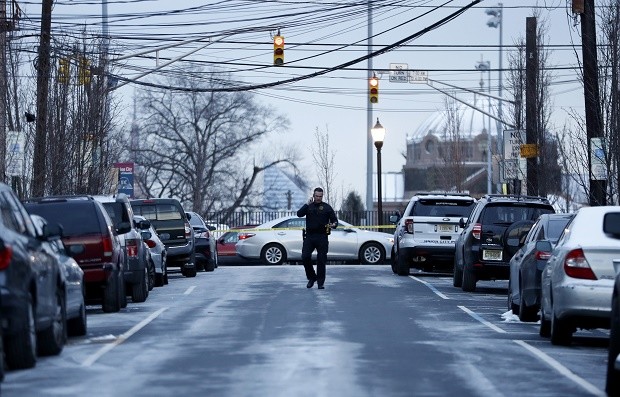
A Union City Police walks inside a police barrier on 20th Street in Union City, N.J., after attention was brought to a home believed to be inhabited by possible family members of the suspect in the shooting at the Fort Lauderdale-Hollywood International Airport, Friday, Jan. 6, 2017, in Union City, N.J. AP
The man police say opened fire with a gun from his checked baggage at a Florida airport had a history of mental health issues — some of which followed his military service in Iraq — and was receiving psychological treatment at his current home in Alaska, his relatives said Friday after the deadly shooting.
“Only thing I could tell you was when he came out of Iraq, he wasn’t feeling too good,” his uncle, Hernan Rivera, told the Bergen Record newspaper (https://bit.ly/2j04ghF ).
Esteban Santiago, 26, deployed in 2010 as part of the Puerto Rico National Guard, spending a year with an engineering battalion, according to Guard spokesman Maj. Paul Dahlen.
In recent years, Santiago had been living in Anchorage, Alaska, his brother, Bryan Santiago, told The Associated Press from Puerto Rico. Bryan Santiago said his brother’s girlfriend had recently called the family to alert them to his treatment, but he didn’t have further details. He said his brother never spoke to him directly about his medical issues.
“We have not talked for the past three weeks,” Bryan Santiago said. “That’s a bit unusual … I’m in shock. He was a serious person … He was a normal person.”
READ: Florida airport shooter was passenger with gun in checked-in luggage
Esteban Santiago was born in New Jersey but moved to Puerto Rico when he was 2, his brother said.
Since returning from Iraq, he had also served in the Army Reserves and the Alaska National Guard in Fairbanks. He was serving as a combat engineer in the Guard prior to his discharge for “unsatisfactory performance,” said Lt. Col. Candis Olmstead, a spokeswoman. She would not elaborate on his discharge.
His uncle and aunt in New Jersey were trying to make sense of what they were hearing about Santiago after his arrest at the Fort Lauderdale airport.
Maria Ruiz told the Record that her nephew had recently become a father and was struggling with the role.
“It was like he lost his mind,” she said of his return from Iraq. “He said he saw things.”
In Anchorage, police officers told reporters that they were interviewing people at an address for Santiago but wouldn’t give details and were keeping journalists away from the home.
Santiago was involved in a number of minor court cases while in Alaska, including fines for not having proof of insurance and a criminal mischief case that led to a deferred sentence. His attorney, Max Holmquist, declined to discuss his client with an Associated Press reporter.